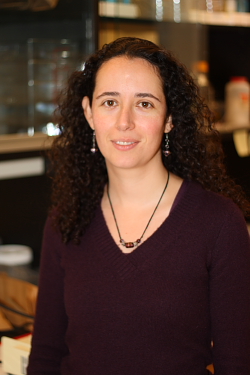

A. Paola Zuluaga
Graduate Student
My name is Paola Zuluaga, I am from Bogotá, Colombia where I studied Biology. After graduation, I worked for two years at the International Center for Tropical Agriculture (CIAT) in Cali, Colombia. I joined Dr. Valerie Verdier’s lab and during this time we studied the cassava (Manihot esculenta Crantz) -Xanthomonas axonopodis pathovar manihotis pathosystem. We accomplished significant contributions on the understanding of the molecular interaction between the plant and the pathogen, and implemented a protocol for the isolation and characterization of resistance genes candidates (RGCs) in cassava.
In 2004, I decided to pursue graduate studies and came to Cornell to work in Dr. Bill Fry’s laboratory. I have been fortunate to work on different aspects of Phytophthora infestans and its hosts tomato, potato and petunia. I have learned about Oomycetes transformation, Phytophthora infestans population structure and the effect of BTH (a salicylic acid analog) on resistance against P. infestans.
I received my Master’s degree on May 2007 and continued to pursue a Ph.D. program under the guidance of Dr. Bill Fry and Dr. Joss Rose. My study aimed to characterize further the mechanism by which P. infestans regulates the transition from biotroph to necrotroph in its interaction with its host tomato. P. infestans is a hemibiotrophic pathogen, with an initial biotrophic growth followed by a necrotrophic stage. As a hemibiotrophic pathogen, P. infestans is likely to secrete proteins early in the biotrophic phase of the interaction that enable it to evade or suppress the plant’s defense responses. Later during the necrotrophic growth of the interaction it is likely to secrete proteins that kill and destroy plant tissue. The current idea that pathogen effectors determine the outcome of the interaction between pathogens and their hosts by manipulating their host defenses and metabolism to establish disease has been mostly documented for bacteria and is scarce in fungi and oomycetes.